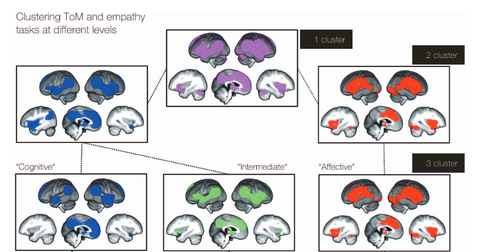Nov 09, 2020
New meta-analysis and review article published in Psychological Bulletin
Growing research interest in social processes over the past two decades has went along with the increasing awareness of high heterogeneity regarding concepts and taxonomy used to study these phenomena. The current study, a collaboration with Matthias Schurz from Innsbruck University and the Donders Institute for Brain, Cognition and Behaviour, Nijmegen, introduces a coherent model of social cognitive processes, integrating and reviewing scientific discoveries on key concepts of social cognition (Empathy, Theory of Mind) regarding their brain activation and structure, as well as behavior. Meta-analytic clustering of different task-clusters of Empathy and Theory of Mind describes social cognition as a multi-level model of hierarchical structure (comparable to models from personality and intelligence research) and introduces three main groups pf neuro-cognitive processes: a) primarily cognitive processes, b) primarily affective processes, and c)integrative processes that engage both, cognitive and affective processes, in parallel. These integrative processes are a key novel finding of our study: many social problems seem to require an integration of classical social cognition abilities.
The article appeared in the journal Psychological Bulletin.
Schurz, M., Radua, J., Tholen, M.G., Maliske, L., Margulies, D.S., Mars, R.B., Sallet, J., & Kanske, P. (2020). Towards a Hierarchical Model of Social Cognition: A Neuroimaging Meta-Analysis and Integrative Review on Empathy and Theory of Mind. Psychological Bulletin. Advance online publication. http://dx.doi.org/10.1037/bul0000303

